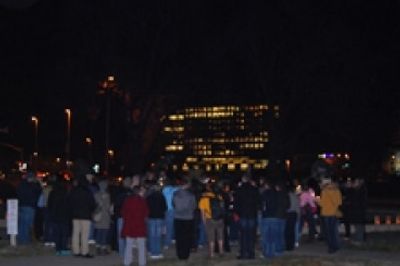On Nov. 20, Transgender Day of Remembrance observances were held at locations around the world. The University of Missouri-Kansas City (UMKC) has been putting on transgender-related events for the last few years and has a Lesbian, Gay, Bisexual, Transgender, Queer, Intersex, and Ally Programs and Services office to assist the university’s LGBTQIA student population.
On Nov. 19, they posted this to their Facebook page:
Reminder: Please join us for Kansas City’s Trans* Day of Remembrance tomorrow, November 20 at 7:30 pm. The event is being cohosted by a committee of volunteers, including members of Kansas Equality Coalition, UMKC’s LGBTQIA Programs and Services, and EQUAL’s Trans Youth group. The candlelight vigil will be located at the JC Nichols Parkway fountain.
As you can see, instead of calling the event Transgender Day of Remembrance, they called it Trans* Day of Remembrance, as if they were doing a wild-card search for any words that begin with ‘trans-’, such as transgender, transsexual, transmission, transaction, or the Transvaal.
I was somewhat offended, although I do understand what they were trying to do — be inclusive, and this is one of the issues that the various transgender communities face.
Some people don’t want to be part of an umbrella term, especially one that was originated by a heterosexual crossdresser, Virginia Prince. Some transsexual women are offended by being called transgender. Some postoperative transsexual women are even offended by being called postoperative transsexual women. They prefer just being called women, although some might be willing to be called a woman with a transsexual past, assuming that transsexuality is a temporary state. Some don’t want to be included with drag queens or crossdressers or fetishistic transvestites, who are often straight men who will wear one or two articles of women’s underwear as part of a masturbation ritual.
Admittedly, the word transgender is kind of awkward. It’s easy for someone to say “I am gay” or “I am a lesbian.” It’s doesn’t seem quite right to say “I am transgender” or “I am a transgender” without adding “person,” “man,” or “woman.”
But trans* isn’t the most offensive word that gets tossed around in conversation. Based on my quick poll in an online group of area transgender people, the most offensive word — and I hate even writing it — is tranny.
Many transgender people view the use of this “T word” similarly to the way many gay men view the use of the “F word.” Many transgender people are especially offended when gay men, who should know better, continue using the “T word.” RuPaul claims to love the word and says that if you’re offended by its use, you should just basically get over it. This is why there’s a Facebook page to boycott RuPaul.
Some transgender people feel that there are several gay men of prominence, including some major LGBTQ organizations, who think they are allowed to use the “T word.” Dan Savage, the columnist and frequent (supposed) representative of the LGBT community on TV, was glitter-bombed last year for allegedly using transphobic language. He denied that it was transphobic.
It’s a problem in the transgender communities: How do similar people create a unified community for political gain while also agreeing to the right to self-identify — creating your own identity and creating new genderless pronouns? It becomes difficult for others to interact with you if you demand to be referred to as a woman with a transsexual past instead of transsexual, especially if you were willing to be referred to as a transsexual before having genital surgery.
Some people say there is too much emphasis on genital surgery. I’ve seen posts on Facebook stating that someone can’t be a voice for transgender issues because she hasn’t had the surgery.
I think it’s more difficult to be a voice or an advocate for a community if you spend time trying to exclude others.
You often become a voice for a community of one.
